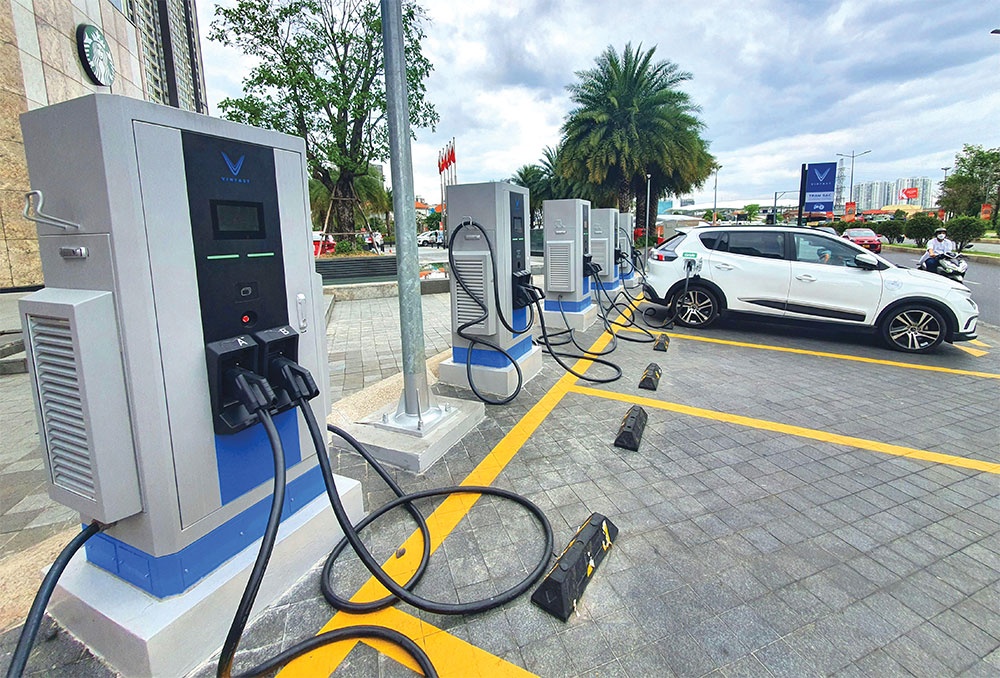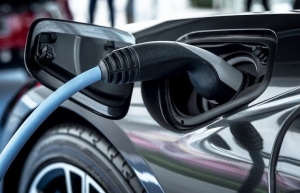EV charging stations enticing for investors
 |
| Only a couple of companies are officially in the charging station segment, but more are on the way, photo Le Toan |
Chinese battery firm Gotion last month invested $150 million in Vietnamese electric vehicle (EV) manufacturer VinFast by acquiring 15 million ordinary shares, representing 0.7 per cent of this company’s total equity.
Gotion is a collaborative partner with VinES Energy Solutions Corporation, an energy solutions provider under Vingroup, in a joint venture to manufacture lithium batteries in the Vung Ang Economic Zone in the central province of Ha Tinh, with the project representing a substantial investment of $275 million.
VinES holds a 49 per cent stake in the venture, while Gotion embraces the remainder. The venture’s primary objective is to develop and produce rechargeable batteries used in EVs and energy storage systems.
“In addition to battery manufacturing, charging stations are also a new potential area right now,” said Vu Tan Cong, deputy director general at Vietnam Automobile Industry and Trading Business Consultants.
In Vietnam, only VinFast and EVIDA are substantially providing electric vehicle battery charging station services.
VinFast is developing charging stations with about 150,000 charge ports nationwide, with a cost of 13 US cents per kWh, while EVIDA is developing public charging stations with a unit price of 38 cents per kWh, adding the activation fee of 20-84 US cents.
“VinFast is currently making up for the losses of charging stations and will gradually increase prices in the near future,” Cong said. “Assuming the charging fee is 34 US cents per kWh, if each station charges 100 cars a day, they can gain $1,000 per day and over $30,000 per month.”
Top enterprises such as ABB and Siemens have expressed their intention to expand the electric charging station business market in Vietnam.
In February, ABB e-mobility supported Audi on the roll-out of its first electric car for the Vietnamese market. ABB’s diverse e-mobility solutions support varying EV charging requirements of customers, which represents the first step in the development of a comprehensive charging network from ABB.
“Vietnam will be one of the countries that ABB E-mobility will support in growing its electric vehicle charging infrastructure. We will focus on how to support the e-mobility market in Vietnam through ABB E-mobility initiatives, such as offering digital solutions for charging infrastructure to ensure consumers have a seamless charging experience,” said Wee Jin Lee, Asia-Pacific regional leader of ABB E-mobility.
Siemens, meanwhile, will offer Vietnamese customers a range of chargers that are smart and flexible. These solutions are deployable in a wide spectrum of use cases for EV charging, such as residential, workplaces, commercial malls, industrial fleets, gas stations, and highway stopovers.
Arjun Raju, head of E-Mobility for Siemens in Asia-Pacific, said, “Through the partnership with EVS signed in April, Siemens is introducing its state-of-the-art e-mobility solutions supporting the roll-out of more EV charging infrastructure in Vietnam, which is essential to growing the adoption of zero-emissions EVs in the country.”
Experts said that the EV charging station networks should be invested in early before expecting the EV’s popularity. The investments in the development of the EV charging station network can be by state-owned, private, and foreign-invested companies.
In line with the country’s action programme for the transition to green energy and mitigation of CO2 and methane in the transport industry, automobiles powered by conventional engines are to be phased out by 2050. By 2040, the manufacturing and importing of motor vehicles equipped with traditional engines will be limited.
BMI Research has predicted that Vietnam’s EV sales in 2023 will double compared to 2022, to about 18,000 units, and sales growth will be over 25 per cent annually over the next 10 years, equivalent to 65,000 units per year.
The Vietnam Automobile Manufacturers Association predicts that the number of EVs in Vietnam will reach about one million units by 2030 and increase to 3.5 million units by 2040.
However, in the view of Cong, the current support and incentive policies on EVs are not yet strong enough to encourage people to use them.
“These lead to hesitation on investments in the EV charging station network, as a result,” he said. “What is more, the national technical regulations on charging stations have not been published yet. Thus, investors do not know how to build and develop the network for EVs, and time is being wasted.”
 | Indonesia strives to convert motorbikes into EVs The Energy and Mineral Resources (ESDM) Ministry of Indonesia is working hard to convert conventional motorbikes into electric vehicles (EVs) to achieve the target of net-zero emissions by 2060. |
 | Insurance groups adjust to electric vehicle trends Vietnam’s pivot to electric vehicles is driving a profound overhaul in its long-established motor insurance sector, mirroring global trends. |
 | Vehicle giants pivot to electrified and hybrid future Carmakers in Vietnam are making dramatic changes to their operations in pursuit of sustainability, through expanding the scope and style of their offerings. |
What the stars mean:
★ Poor ★ ★ Promising ★★★ Good ★★★★ Very good ★★★★★ Exceptional
Related Contents
Latest News
More News
- SK Innovation-led consortium wins $2.3 billion LNG project in Nghe An (February 25, 2026 | 07:56)
- THACO opens $70 million manufacturing complex in Danang (February 25, 2026 | 07:54)
- Phu Quoc International Airport expansion approved to meet rising demand (February 24, 2026 | 10:00)
- Bac Giang International Logistics Centre faces land clearance barrier (February 24, 2026 | 08:00)
- Bright prospects abound in European investment (February 19, 2026 | 20:27)
- Internal strengths attest to commitment to progress (February 19, 2026 | 20:13)
- Vietnam, New Zealand seek level-up in ties (February 19, 2026 | 18:06)
- Untapped potential in relations with Indonesia (February 19, 2026 | 17:56)
- German strengths match Vietnamese aspirations (February 19, 2026 | 17:40)
- Kim Long Motor and AOJ Suzhou enter strategic partnership (February 16, 2026 | 13:27)

 Tag:
Tag:


















 Mobile Version
Mobile Version